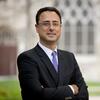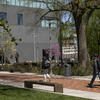Temple University’s strategic plan represents a bold and innovative vision for our future. The planning process began in 2020 and in spring 2022, Provost Gregory Mandel was tasked with leading the final stages of the process and implementation of the plan. This process involved collaboration across the university community to ask the difficult questions, understand our challenges and leverage our opportunities.

Gregory N. Mandel
Gregory N. Mandel is the provost of Temple University and Laura H. Carnell Professor of Law at the Beasley School of Law. Prior to serving as provost, he was dean of the Law School for five years.
Learn more about Provost MandelWhat did the strategic planning process look like?
Designing our future was a universitywide effort. The process was stewarded by three committees. The 42-member Strategic Planning Steering Committee, a diverse group of representatives from a broad range of schools and colleges, administrative units, alumni, and community members, led the introspection and assessment phase of the process. The Futures Committee, a group of senior university leaders, focused on our vision for the university. The Executive Committee oversaw and facilitated the strategic planning process.
- Dan Berman, chair and vice provost for undergraduate studies
- Tiffenia Archie, associate vice president and chief inclusion officer, Institutional Diversity, Equity, Advocacy and Leadership
- Mustafa Badi, assistant professor, Kornberg School of Dentistry
- Kathryn D’Angelo, assistant vice president, finance and administration, Office of the Vice President, Chief Financial Officer and Treasurer
- Rosemary Dillon, director of special projects, Office of the Vice President for Research
- Shawn Fagan, assistant dean of undergraduate affairs, College of Engineering
- Mykal Gerald, student, Lewis Katz School of Medicine
- Ingrid Heim, associate vice president, alumni and constituent engagement, Institutional Advancement
- Stephanie Ives, associate vice president and dean of students
- Jeremy Jordan, associate dean, School of Sport, Tourism and Hospitality Management
- Larry Kaplan, professor, Lewis Katz School of Medicine
Rob Kulathinal, associate professor of biology, College of Science and Technology
Ken Lawrence, alum, CLA ’95
Cindy Leavitt, vice president information technology services and chief information officer
Peter Marshall, professor of psychology and chair, College of Liberal Arts
Omar Martinez, associate professor of social work, College of Public Health
Meg McGoldrick, alum, CLA ’74, FOX ’76
Salil Mehra, Charles B. Klein Professor of Law, Beasley School of Law
Swati Nagar, professor of pharmaceutical sciences, School of Pharmacy
Ruth Ochia, professor of bioengineering, College of Engineering
Jamie Payton, chair and associate professor of computer and information science, College of Science and Technology
Joseph Paris, assistant dean of enrollment management and marketing, College of Education
Aron Pilhofer, James B. Steele Chair in Journalism Innovation, Lew Klein College of Media and Communication
Gianni L. Quattrocchi, president, Temple Student Government
Herb Reid, community partner, Maze Group Development, Inc.
Tony Seeton, assistant professor of strategic management, Fox School of Business and Management
Ray Smeriglio, alum, KLN ’15
Emily Spitale, chief marketing and communications officer, Lewis Katz School of Medicine
Andrea Swan, vice president for public affairs, Community Relations
Robert Tarola, alum, FOX ’73
Renee Tobin, professor and chair, College of Education and Human Development
Nancy Turner, associate director, Charles Library
Jennifer Van, associate professor and chair, School of Podiatric Medicine
Kimmika Williams-Witherspoon, associate professor of theater, School of Theater, Film and Media Arts
Nicole Westrick, director of marketing and communication, University College
Byron Wolfe, professor, Tyler School of Art and Architecture
Emilia Zankina, dean, Temple University Rome
- David Boardman, dean, Lew Klein College of Media and Communication
- Susan Cahan, dean, Tyler School of Art and Architecture
- Jim Cawley, vice president for institutional advancement
- Richard Deeg, dean, College of Liberal Arts
- JoAnne Epps, senior advisor to the president, Office of the Provost
- Ken Kaiser, senior vice president and chief operating officer
- Cindy Leavitt, vice president information technology services and chief information officer
- Greg Mandel, provost and Laura H. Carnell Professor of Law
- Michele Masucci, vice president for research
- Laura Siminoff, Laura H. Carnell Professor, College of Public Health
- JoAnne Epps, senior advisor to the president, Office of the Provost
- Ron Anderson, dean, Fox School of Business, School of Sport, Tourism and Hospitality Management
- Dan Berman, vice provost for undergraduate studies
- Heather Clauss, associate dean, Katz School of Medicine
- Michael Gebhardt, vice president and university secretary
- Jennifer Ibrahim, associate dean, College of Public Health
- Cindy Leavitt, vice president information technology services and chief information officer
- Robert Stroker, dean, Boyer College of Music and Dance, School of Theater, Film and Media Arts
In the first phase of the process, we engaged in assessment, evaluation and research, with a critical eye on who we are as a higher education institution, how we operate in this space and in the world, our capabilities, and our points of growth. From there, we articulated our values, crafted our aspiration statement and defined our strategic priorities.
Phase 1: Assessment and Research
The Steering Committee led assessment and research in the first phase. It objectively assessed the university’s role in the changing higher education landscape, allowing us to identify and address our strengths, capabilities and points of growth. It delved into a period of research and discovery to determine and catalog Temple’s strengths, weaknesses, opportunities and threats, as well as the university’s core values, within the context of the dynamic nature of higher education in the U.S.
Phase 2: Aspiration Statement and Strategic Priorities
With a clear understanding of the university’s strengths and core values established in Phase 1, Phase 2 focused on developing the Flying Further aspiration statement and strategic priorities.
The aspiration statement is the foundation of our work at Temple. It articulates our shared purpose—what makes our community unique and why what we do is important. Once the statement was developed, the focus shifted to the future and the development of comprehensive strategic priorities to realize that collective vision.
The university’s strategic priorities guide the strategic plan and how we engage in meaningful change for the future. Our efforts focus on five strategic priorities: We will facilitate boundless access for future generations of learners, providing exceptional educational excellence by aligning the future of learning with the future of work; we will build on and support the strength of our faculty to provide extraordinary thought leadership in research, scholarship and creative expression and enhance our efforts in community engagement, from our neighbors in North Philadelphia to global communities impacted by our campuses around the world; and, we will be intentional in elevating our foundation for tomorrow so that our standing reflects the remarkable quality of our special university.
Phase 3: Action Plan
Phase 3 focused on the university’s action plan to develop initiatives with measurable outcomes that would guide us toward achieving our strategic priorities. Faculty, staff and students provided ideas for initiatives to help us reach our goals. We constructed an internal universitywide structure to support further strategic plan development and execution. Finally, we prioritized the most promising initiatives and are helping stakeholders to develop detailed implementation plans.

